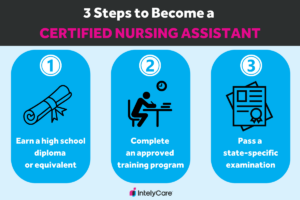How to Become a CNA

Working as a certified nursing assistant (CNA) is a great job for anyone who wants to get into healthcare and start working directly with patients relatively quickly. You don’t need a college degree to begin your studies for this role.
Additionally, this job can set you up for a successful career path. If you find you love the atmosphere, it’s a great stepping stone to other healthcare jobs. Are you wondering how to become a CNA how to earn CNA certification? Let’s look at what a CNA does, the education and skills you need for CNA certifications, and the salary you can expect.
What Is a CNA?
A CNA is a trained healthcare professional who assists registered nurses (RNs) and licensed practical nurses (LPNs) in their duties. CNAs provide basic patient care, and are often the first point of communication between patients and other medical staff. As you take a patient’s blood pressure, temperature, and other vital signs, you’ll be talking and engaging with them, recording any health concerns so that you can report them to your nurse supervisor.
As a CNA, you could be considered the “boots on the ground” of healthcare settings including hospitals, skilled nursing facilities, and assisted living communities. Some of these professionals opt to become travel CNAs and work assignments on a contract basis.
RNs supervise your responsibilities and oversee overall patient care, but you are often the first person a patient or resident sees every morning. Part of the reason being a CNA is such an ideal entry point to the healthcare field is because it makes a true impact on the well-being of patients.
Note that this job is called different things depending on where you’re located. CNA is referred to as a:
- Licensed nursing assistant (LNA) in New Hampshire and Vermont
- State registered nursing aide (SRNA) in Kentucky
- State tested nursing aide (STNA) in Ohio
What Do Certified Nursing Assistants Do?
When you earn CNA certification, your responsibility is to provide basic care and help patients with their daily activities. Some tasks overlap with those of an LPN, but the CNA scope of practice is more limited than that of an LPN.
Typical CNA job duties include:
- Providing emotional support and social stimulation to patients.
- Helping patients with basic hygiene like bathing, using the toilet, shaving, and clipping their nails.
- Helping patients get dressed.
- Serving patients meals and assisting with eating, if necessary.
- Safely transferring patients by helping them move from a bed to a wheelchair, or repositioning them.
- Changing bedsheets and keeping rooms clean and tidy.
- Answering patient calls.
- Monitoring patients’ vital signs and overall wellbeing.
- Providing reports and documentation on the condition of patients.
- Making sure supplies are stocked.
- Assisting nurses and physicians with certain procedures.
Throughout the day, you have frequent contact with patients and residents who often see you as a friend. They might be more open to share with you how they’re doing or what’s on their mind, which can go a long way in making them feel at ease. It’s a deep, caring relationship that can be very fulfilling.
For more insights, check out this sample CNA job template. It shows you the types of tasks employers expect nursing assistants to assume responsibility for.
Where Do CNAs Work?
According to the Bureau of Labor Statistics, the workplaces that have the highest concentration of nursing assistants include:
- Skilled nursing facilities
- Assisted living facilities and retirement communities
- Specialty hospitals
- General and surgical hospitals
- Home health care services
How to Become a CNA: Training, Skill-Building, and Certification
Every state has a separate list of requirements for how to become a CNA. Be sure to check to see what you need in your state of residence. These are the typical steps.
Step 1: Generally, you’ll need a high school diploma or equivalent. A college degree is not necessary.
Step 2: Sign up for an approved CNA training program. CNA programs are available at community colleges, vocational schools, and within some hospitals. Certain state-approved training programs are available in high schools, enabling you to graduate and enter a job. You can also find virtual schools that teach you how to become a CNA online.
During your CNA courses, you will learn the basics of patient care and medical skills like taking vital signs. Typical CNA classes include:
- Basic patient care
- Infection control
- Nutrition
- Anatomy
- Communications and documentation
- Safety and emergency procedures
- Patient rights
You’ll also learn best practices and ethics when working with patients. Your schooling may include hands-on training, where you work under the guidance of an RN. Beyond what you learn in CNA courses, you must have the right set of inherent skills to succeed at the job. These include:
- Being a team player.
- Careful attention to detail.
- Dependability and accountability.
- Patience and compassion.
- Physical fitness.
- Willingness to engage in tasks like bathing and lifting patients.
- Excellent communication skills.
- Knowledge of medical terminology.
Step 3: Pass an exam to obtain certification. You may also pursue specialized training in specialties like hospice or memory care.
What Is CNA Certification?
After you learn how to become a CNA in your classroom training, you will need to be certified by the state before you can start working as a CNA. CNA certifications ensure that the workers in these roles posses the skills and knowledge to work with patients.
As mentioned, each state sets its requirements for CNA certifications, but they all require proof you have completed an approved training program and passed an exam. Some states require you to pass the National Nurse Aide Assessment Program (NNAAP) exam. Exams can include written, oral, or demonstration portions where you show that you know how to perform specific tasks.
Some state exams include one, two, or all three of these CNA certification exam modules. You’ll find exam centers throughout the U.S. that have study materials.
Depending on where you live, you may need to renew your certification every year or more. Check with your state board of nursing to find out how to renew and how much (if any) continuing education contact hours you’re required to complete during each renewal cycle. And if you’re planning to relocate, check to see if your new state offers free CNA reciprocity for your current certification.
How Long Does It Take to Become a CNA?
You can complete training, get your CNA certification, create an awesome CNA resume, and start working in as little as 4 to 12 weeks, depending on where you take classes. Also, the legal requirements vary from state to state, which affects how long it will take you to complete everything.
Being a CNA is an excellent way to get your foot in the door of healthcare and gain a basic understanding of clinical nursing knowledge. This exposure gives you a solid foundation upon which to build. Should you choose, you can then further your CNA career by attending nursing school to become an LPN or RN.
Advance Your Career: Become a Certified Medication Aide
If you are interested in taking on a more advanced role, you can explore additional training to become a certified medication aide, which allows you to dispense certain medicine to patients and residents.
This important role can alleviate some of the demands typically put on RNs, which frees them up to focus on other critical tasks. Note that not all states sanction medication aides, but those that do have seen the benefits. Check out the latest medication aide jobs on IntelyCare.
Advance Your Career: Become a Geriatric Nursing Assistant
Note that in Maryland, a CNA can complete additional certification to become a geriatric nursing assistant (GNA) and work with the elderly population. Have a look at the available GNA jobs on IntelyCare.
How Much Does a CNA Make?
The average CNA salary is $39,610 per year, or $19.04 per hour. Your pay will likely be based on your experience, type of facility, and geographical location. The states that employ the most CNAs are:
You’ll notice that these states are different from those that have the highest annual CNA salary levels:
The reason for this disparity? Demand. Just because you’re living in a state with many other working CNAs doesn’t necessarily mean that your pay will be higher than if you worked in a state with fewer CNAs. Patient needs vary across the country, which affects the demand for healthcare workers and the salary that’s offered.
Find out what you might earn in your area by checking the latest CNA jobs on IntelyCare.
Look to the Future
When you were learning how to become a CNA, you might not have considered when and where you’d work. Curious about where your career might take you? IntelyCare can help. Tell us the kinds of jobs for nursing professionals that interest you, and we’ll deliver a curated list right to your inbox.




